Rebels Without a Clause
Word Play: Julia Ann Delbridge, Dragon's Breath Poetry founder and queen of the Santa Cruz spoken word scene, explains the judging point system and the point of the matter at a recent slam at the Santa Cruz Brewery and Front Street Pub.
Poetry slams offer up a dazzling free verse hybrid of literature, performance art and stand-up comedy, where elitist values are overthrown by something much more democratic and sometimes much more vulgar
By Troy Patterson
THE FRONT STREET PUB IS A bright, cheery place--framed coasters on the walls, softball trophies on the bar, no smoking allowed. Tonight, while the patrons in the front room watch pre-season football, 50 or 60 adults are gathered in back to witness an exhibition match that is just as brutal and twice as fierce. Tonight, a local group called the Dragon's Breath Company of Poets transforms itself into the Monterey Bay National Poetry Slam Team.
In preparation for the 1996 National Poetry Slam--a competitive poetry reading at which one of 27 teams will be deemed "the winner"--Monterey Bay is scrimmaging the team from Berwyn, Illinois. The evening's fight card features an open slam--a competition waged among all individuals bold enough to enter--followed by the main bout of verbal fisticuffs.
Julia Delbridge, the founder of Dragon's Breath and the organizer of this event, paces the room with pencil and paper. "We need judges," she says, "Who among you here are brave enough to be judges? What guts have you got?"
Three semi-interested parties eventually raise their hands. They receive scoring sheets and are told to rank each performance on a scale of zero to 10--"like Olympic diving," Julia offers. A woman reads one quick poem to warm up both the judges and the crowd, then the open slam is on.
The first poet approaches the microphone to deliver average verse in an impenetrable English accent. He receives moderate applause from the audience and 7's across the board from the judges. The second, published poet Bert Glick, gives a fast, witty polemic against George Bush and the Persian Gulf War, "KIA/CIA/ MIA/Friendly fire today ... "--9, 10, 9. Next, a scholarly lad reads an ode to a coffee shop and a pedantic little number called "Life Costs Money"--7.5, 7, 8. The fourth poet recites rhymed couplets of abstract hippie pabulum to a dead room--7.5, 6.5, 7.
Glick wins the slam and takes home a handsome edition of Salamander's Moonwater Brunch, a collection of verse by the members of Dragon's Breath. Now it's time for the main event, and Monterey Bay is up first.
There is Debra Holton, who smoothly shifts from nostalgia to sarcasm as she riffs on Charles Bukowski and lost innocence. There is Mudra, reading ghostly, gerund-heavy verse: "the faint scent/of desire escaping/ seeping into subway sewers." There is Sally NeSmith, who unironically offers "Make a difference/Harness brain-wave energy/Soothe this troubled world" in a story-time alto. And there is Josh Milikan, the star of the bunch, a virtuoso of neurosis. "I had a girlfriend once who was late for every period," starts one poem. He clutches the mike with anxious intensity, and he rocks the house. The home team is scrappy and earnest and fairly well-received.
Then comes Berwyn. Berwyn is a town on the southwestern fringe of suburban Chicago. Accordingly, the team comes out like the Bulls--swift, slick and self-consciously bad-assed. Monica Lee Copeland is the literary analog of Dennis Rodman, an event unto herself who sings, shouts, squawks, struts and stomps her way through the team's opening piece, "Burn, Motherfucka' Burn." Daniel Ferri is Bulls coach Phil Jackson. Not just because he's the white guy--and his poetic persona is The White Guy, as in one work which celebrates his discovery of Motown: "Lawrence Welk blindfolded me with a blizzard from his bubble machine"--but because he's the team leader and because, by day, he's a teacher. Tina Marie Wright has the aura and attitude of a second-string rookie, a capable but unremarkable co-star whose poems seem urgent but are forgettable. She is strictly JV.
Reggie Gaines, then, would be Berwyn's Jordan, a graceful, genial All-Star with talent to burn. He displays a jaw-dropping command of sound, whether keeping the crowd warm between poems or eulogizing Jimi Hendrix:
And the muse
There hasn't been any scoring, but there hasn't been a need for any. Berwyn was polished, precise and utterly untouchable. Afterward, I talk to Gaines, who tells me the Midwest team has spent the last week careening across the continent in a rented mini-van, vacationing and sightseeing, giving performances here and in Las Vegas, Los Angeles and San Francisco and finally heading to the National Slam in Portland that weekend. He is ambivalent about the poetry scene in L.A. "Some of it was powerful, powerful stuff. But some of it was bullshit--people just talking about fucking. ... Talking about fucking dead dogs." Still, it's been a worthwhile trip.
"I saw tumbleweed," Gaines says, "You just don't see that shit in Chicago."
Point System Lit
CHICAGO IS THE BIRTHplace of the poetry slam. Throughout the early '80s, Chicago poets and actors had been toying with the idea of competitive readings, and in 1986 Marc Smith--a poet, construction worker, Golden Gloves boxer and baseball fanatic--conceived the format and coined the term. (That's slam as in baseball's grand slam.) The concepts of both poetry slams and slam poetry--the latter being the politically loaded, post-confessional, pop-cultured free verse characteristically read at poetry slams--spread quickly from coast to coast. Recent years have witnessed a Spoken Word Unplugged special on MTV, a similar feature at the Lollapalooza music festival and poetry readings in Gap commercials.
In its seventh year, the National Slam brings together 27 teams, frequently from college towns--Ann Arbor, Athens, Austin and the like--for four days of slamming. In the two qualifying rounds, three teams and one individual performer are selected at random to match up against each other at one of the four venues. (Monterey Bay drew Vancouver and Winston-Salem in Round 1, Portland and Roanoke, Virginia, in Round 2.) Every bout, then, includes 13 performances--one by each of the four members of each team plus one individual performance.
An individual's performance is given a score from zero to 10--decimal points, please--by each of five judges, four drawn from the audience plus one "guest judge." Highest and lowest scores are dropped, the other three scores are added up. At the end of Round 2, the 18 best-ranked teams advance. The process is repeated in later rounds until the 18 are narrowed down to one. No repeating a poem until the final round. No props, costumes, pre-recorded music or musical instruments allowed. Three minutes maximum per performance.
There is an abundance of auxiliary slams and events--the Limerick Slam, the A Cappella Rap Slam, the Bad Poetry Slam, the Midnight Erotic Reading, the Head-to-Head Haiku Slam, for example--plus pool parties and softball games and gossip and schmoozing with talent scouts and that baroque American habit called "networking."
The charge most frequently levied against poetry slams is that it is crass, debasing and generally inane to believe that literature can be judged by a point system. I don't entirely disagree, but neither do most slammers. Julia Delbridge points out that the slogan--the mantra--of one recent National Slam was, "The points are not the point. The point is poetry."
Ode on Ditched Values
IN A CULTURE where very few people actually read any literature at all, the slam is a festive, audience-friendly way of getting folks to listen to it. On one hand, the slam serves to popularize poetry, give writers an outlet for their work and elevate the national culture. On the other, it cultivates a listenership that doesn't necessarily know the difference between a sonnet and a potato, as I found out while chatting with one of the judges at the Front Street Pub reading:
"Do you come to these things often?"
"I've been to a few."
"Have you judged one before?"
"No."
"Well, what score would you give Ode on a Grecian Urn?"
"Who wrote that?"
"John Keats."
"I don't know who he is."
"What about The Love Song of J. Alfred Prufrock?"
"I don't know any Prufrock."
In itself, this exchange not only serves to demonstrate that I'm a snob, but in the larger context, also points up a few defining phenomena of slam poetry. First, the form rejects the bourgeois values and elitist inaccessibility of academic poetry, instead offering verse that is sometimes more truly democratic and sometimes just more vulgar.
Slam poetry exists in the same vein of Anglo-American literature as English Romanticism, Walt Whitman and the Beats--tough, innovative rebels. The ultimate limitation for the form may be that, unlike their literary ancestors, writers raised and fed solely on slam poetry don't understand exactly what it is they are rebelling against or why they are innovating on it.
But such matters are issues of texts, of ink on paper, and the other compelling thing about slam poetry is that it isn't simply poetry. Perhaps it is something more, perhaps it is just something else. Either way, on stage it reveals itself as a dazzling hybrid of literature, performance art, stand-up comedy and dramatic monologue.
The publicists of the National Slam put it this way: "The National Slam advocates the idea that the performance of poetry is equal in artistic performance to the writing of words on the page. It believes that poetry is and should be a spectrum of forms and disciplines that accommodates academics and performers, entertainers and the public at large." Which is a publicist's way of saying that slam poetry's primary concern is the oral tradition. At its best, slam poetry explores new possibilities for an old art form--one as enduring as Homer, as immediate as hip-hop.
Coast-to-Coast Poetic Cross-Pollination
THE SQUAD FROM Providence, Rhode Island, took first place at the big dance in Portland. Berwyn was second. The Monterey Bay National Poetry Slam Team didn't place in the top two-thirds, but it hadn't really expected to. Julia Ann Delbridge founded Dragon's Breath a mere six months ago. There's been a steady stream of events--a Dead Poets Slam here, a Full Moon Poetry Beach Bonfire and Pot Luck Dinner there--but it is still a young team.
Delbridge is looking ahead to an upcoming fundraiser for the Resource Center for Non-Violence, to the 1997 National Slam in Connecticut and to next year's poetry Olympics in Johannesburg, South Africa. Best of all, there's the possibility that other poets she met in Portland will make their way through town, engendering coast-to-coast poetic cross-pollination.
So, as she looks ahead, Delbridge looks back on the National Slam the way a novelist looks back on an undergraduate fiction workshop or the way an expansion team coach looks back on his first season: "It was a great training ground."
This page was designed and created by the Boulevards team.
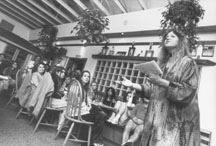
Robert Scheer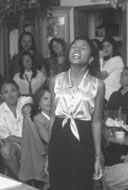
and bruise
of yo' sado-masochistic blues;
would ooze through floors
and LSD'd doors
leaving psychedelic relics wrecked
on psy-co-de-licked shores.
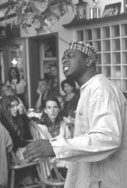
Grand Slam 1: Reggie Gaines of Team Berwyn (near Chicago) was by far the pick of the poetry litter at a slam held last month at the Santa Cruz Brewing Company/Front Street Pub.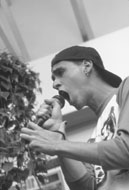
Grand Slam 2: Santa Cruz-based Dragon's Breath Company of Poets was well-represented by Josh Milikan, a recent arrival from Los Angeles who went word-to-word with the sharp and savvy out-of-state poemslingers like Daniel Ferri.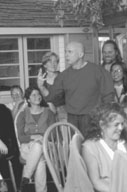
Grand Slam 3: The Berwyn competitors made it all the way to the final round at the National Slam in Portland before losing to the world champs from Providence, Rhode Island.
From the September 19-25, 1996 issue of Metro Santa Cruz
Copyright © 1996 Metro Publishing, Inc.
![[MetroActive Books]](/books/gifs/books.gif)